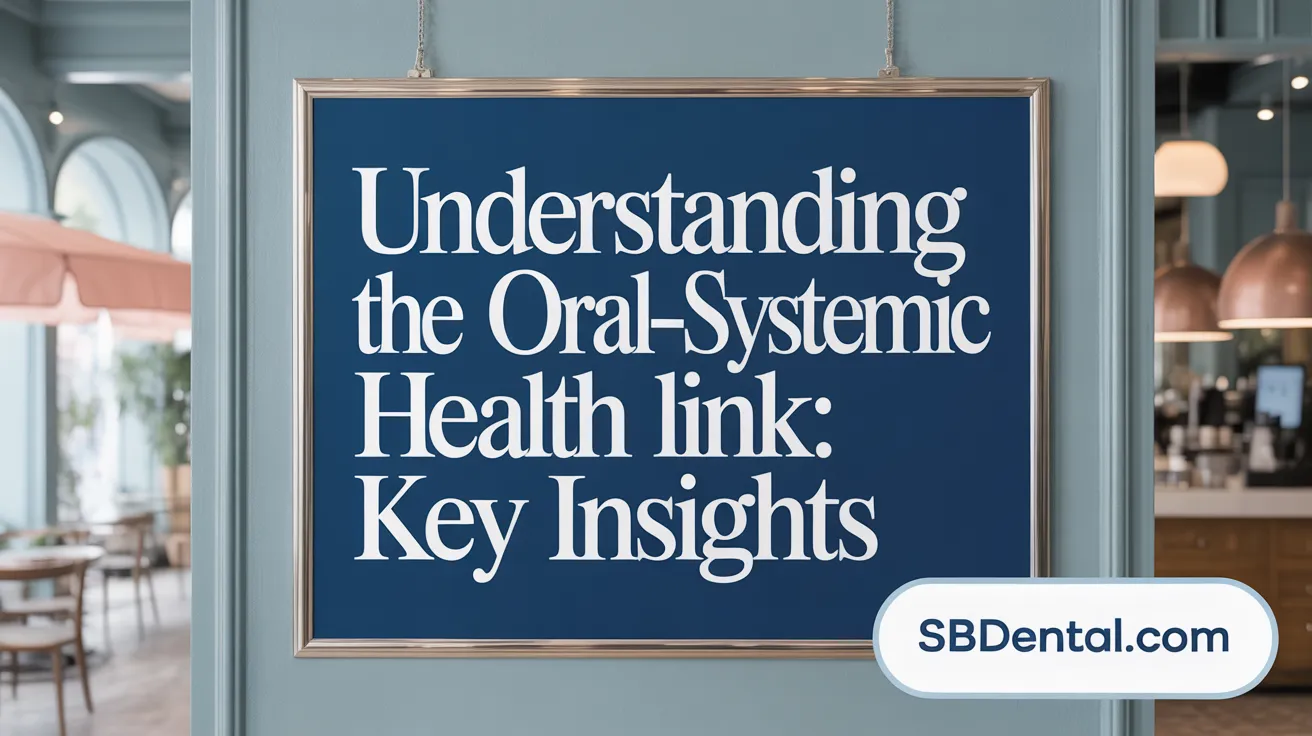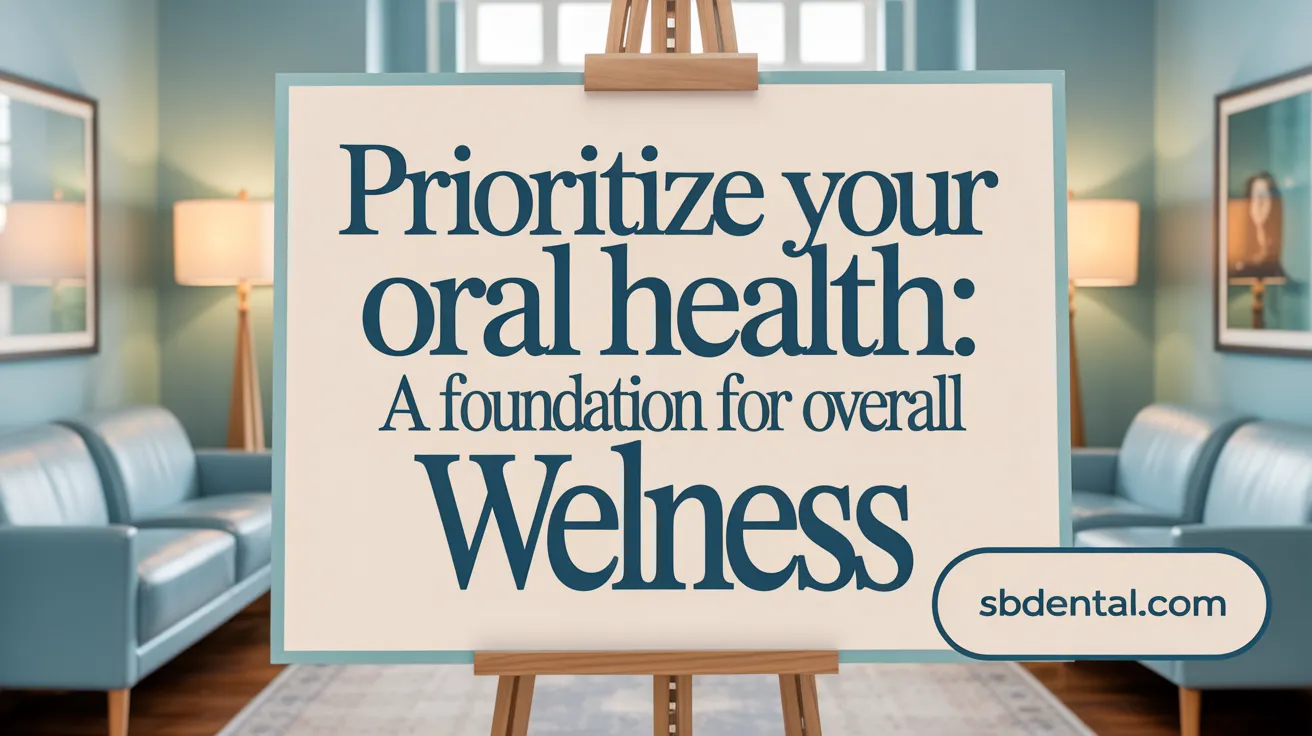Understanding the Crucial Link Between Oral Care and Systemic Health
Oral health is far more than a radiant smile; it is a vital indicator and influencer of your overall well-being. Scientific research has increasingly revealed the profound connections between oral hygiene and systemic health conditions such as cardiovascular disease, diabetes, and neurodegenerative disorders. This article explores how maintaining proper oral care practices not only protects your teeth and gums but also plays a fundamental role in preventing serious systemic illnesses, enhancing quality of life, and supporting comprehensive health management.
The Connection Between Oral Health and Systemic Health: A Comprehensive Overview

What is the connection between oral health and overall systemic health?
The link between oral health and overall health is extensively supported by scientific research, which demonstrates that oral infections like periodontal disease significantly influence many systemic conditions. Chronic inflammation resulting from periodontal pathogens can enter the bloodstream, promoting inflammation in blood vessels and tissues elsewhere in the body. This process contributes to the development and progression of cardiovascular diseases, such as atherosclerosis and stroke, as bacteria and inflammatory markers cause arteries to harden and promote clot formation.
Moreover, oral health is closely intertwined with diabetes. Periodontal disease can impair blood sugar regulation, making management of diabetes more challenging, while high blood sugar levels can increase susceptibility to gum disease. This bidirectional relationship underscores how systemic diseases and oral infections can exacerbate each other (oral health and diabetes connection).
Research has also linked poor oral health to neurodegenerative disorders such as Alzheimer’s disease. Bacteria from the mouth, including those involved in periodontal disease, may access brain tissue through the bloodstream, setting off neuroinflammation and potentially contributing to plaque formation characteristic of Alzheimer’s (oral health and Alzheimer's disease).
The oral microbiome—a complex community of bacteria, fungi, and viruses—plays a central role in this connection. Dysbiosis, or imbalance in this microbiome, can lead to both oral diseases and systemic health issues, such as rheumatoid arthritis and certain cancers. Systemic dissemination of pathogens and inflammatory molecules from the oral cavity can affect organs like the lungs, leading to respiratory illnesses including pneumonia (oral health and systemic diseases).
Factors like shared risk behaviors (smoking, poor diet), genetic predispositions, immune response alterations, and environmental exposures further influence how oral and systemic health are interconnected. Addressing these links through improved oral hygiene, regular dental care, and integrated healthcare strategies can reduce systemic disease burden and enhance overall health outcomes (Oral-Systemic Health).
How do mechanisms link oral health to overall health?
Mechanisms connecting oral and systemic health include microbial dysbiosis, systemic inflammation, bacteremia (bacteria entering the bloodstream), viremia, and immune response alterations. Poor oral hygiene cultivates pathogenic bacteria, which can invade the bloodstream during everyday activities or dental procedures, triggering systemic inflammatory responses. Chronic inflammation from periodontal disease can promote arterial damage, contribute to clotting issues, and accelerate degenerative processes in vital organs (oral health and systemic diseases).
The oral microbiome’s imbalance influences the development of systemic autoimmune diseases, such as rheumatoid arthritis, and may impact brain health, relating to conditions like Alzheimer’s. Some oral pathogens have been found in the brain tissues of Alzheimer’s patients, reinforcing the notion that oral infections might contribute to neurodegeneration (Connection between oral health and overall health).
Viral infections, including herpesviruses and even SARS-CoV-2, can affect periodontal tissues, further complicating systemic health. These viral influences may exacerbate local inflammation and immune dysregulation, impacting overall health (oral health and systemic diseases).
What is the bidirectional relationship between oral and systemic conditions?
The relationship between oral and systemic health operates in both directions. For example, systemic diseases like diabetes increase the risk of periodontal disease by impairing immune defenses and tissue healing. Conversely, periodontal disease worsens blood sugar control, creating a cycle that complicates disease management (periodontal disease and diabetes connection).
Similarly, cardiovascular conditions influence oral health. Atherosclerosis promotes inflammatory pathways that can be triggered or worsened by oral infections. During pregnancy, hormonal changes heighten susceptibility to gum disease, which has been associated with adverse outcomes like premature birth (oral health and pregnancy complications).
Infections originating in the mouth, especially pneumonia, demonstrate how poor oral health can influence respiratory health. Bacteria from periodontal sites can be aspirated into the lungs, leading to infections, especially in vulnerable populations (oral infections and respiratory diseases).
How does the oral microbiome impact overall health?
The oral microbiome—comprising over 700 bacterial species along with fungi and viruses—is essential for maintaining oral and systemic health. When balanced, it protects against pathogenic bacteria; however, factors such as poor hygiene, smoking, and diet can disrupt this balance (Oral microbiome and whole body health).
Dysbiosis leads to overgrowth of harmful bacteria, causing periodontal disease and facilitating systemic infections. This imbalance has been linked to systemic inflammatory states that contribute to a variety of diseases like cardiovascular disease, metabolic syndrome, and cancers (oral health and systemic diseases).
Emerging research suggests that modulating the oral microbiome—via probiotics or antimicrobial therapies—may become a strategy to prevent or mitigate systemic diseases influenced by oral health. Overall, maintaining a healthy oral microbiome is crucial for preventing both local oral diseases and broader systemic conditions (oral microbial dysbiosis interventions).
Oral Hygiene and Its Impact on Chronic Diseases: Diabetes and Cardiovascular Concerns

How does oral hygiene and dental care impact systemic diseases like diabetes and cardiovascular disease?
Good oral hygiene and regular dental visits are essential in managing and reducing the impact of systemic diseases such as diabetes and cardiovascular conditions. Poor oral health, especially periodontal disease and tooth loss, has been strongly linked to increased risks of heart failure, stroke, hypertension, and difficulties in controlling blood sugar levels in diabetics.
Maintaining consistent practices such as brushing teeth at least twice daily with fluoride toothpaste, flossing interdental spaces, and visiting the dentist regularly helps lower systemic inflammation markers, including C-reactive protein (CRP). Reduced inflammation can decrease the progression of atherosclerosis and improve vascular health (Oral biomarkers linked to cardiovascular risk).
The core mechanisms involve bacteria from the mouth gaining access to the bloodstream (bacteremia), which can promote endothelial dysfunction—a key step in the development of blood vessel damage. These oral bacteria can trigger systemic inflammatory responses, further exacerbating the formation of arterial plaques, leading to cardiovascular diseases.
In diabetics, poor oral health impairs glycemic control, creating a vicious cycle where high blood sugar levels increase the risk of periodontal disease, which in turn worsens hyperglycemia. Conversely, effective oral care can contribute to more stable blood glucose levels and fewer diabetic complications.
Therefore, integrating oral health care into overall health strategies is vital. Enhanced awareness, preventive dental practices, and collaborative healthcare approaches can mitigate the burden of chronic diseases, contributing substantially to better health and quality of life.
Oral Health’s Role in Overall Wellness and Disease Prevention

What role does oral health play in overall wellness and disease prevention?
Oral health is fundamental to overall health and plays a vital role in preventing a wide range of systemic diseases. Good oral hygiene—such as regular brushing with fluoride toothpaste, daily flossing, and routine dental check-ups—helps control harmful bacteria in the mouth. This reduces the risk of infections like gum disease and tooth decay, which can affect other parts of the body.
Preventing oral infections is crucial because bacteria from the mouth can enter the bloodstream, leading to systemic inflammation and contributing to conditions such as heart disease, stroke, pneumonia, and respiratory illnesses. For instance, bacteria like Porphyromonas gingivalis have been linked to cardiovascular problems and even neurodegenerative diseases like Alzheimer’s.
Beyond bacterial control, oral health influences functions essential to daily life, including eating, speaking, and social interactions. These functions are closely connected to mental well-being, self-esteem, and social participation. When oral health deteriorates, it can cause pain, discomfort, social withdrawal, and mental health challenges.
Special populations, such as pregnant women, are more vulnerable; poor oral health during pregnancy—like gum disease—has been associated with adverse outcomes such as premature birth and low birth weight.
In addition, socio-economic factors and social determinants of health significantly impact oral health disparities. Marginalized groups often face barriers to access, resulting in higher rates of oral diseases and related systemic health issues.
To combat these issues, integrating preventive dental care into general health strategies is essential. Public health initiatives like community water fluoridation and education campaigns promote oral health at the population level. Healthcare providers are encouraged to work collaboratively, ensuring that dental screenings and preventive measures become a routine part of healthcare, ultimately reducing disease burden and improving quality of life.
In conclusion, oral health doesn’t just affect the mouth; it is a cornerstone of overall wellness. Prioritizing preventive care, addressing social determinants, and fostering collaboration among health professionals are vital steps to safeguard and improve health outcomes for all.
Diet, Lifestyle, and Oral-Overall Health Interplay
How do diet, nutrition, and lifestyle factors influence oral and overall health?
Diet and lifestyle choices play a crucial role in determining both oral and systemic health outcomes. Frequent consumption of free sugars—found in candies, sugary drinks, and processed foods—fuels the growth of harmful bacteria in the mouth, resulting in dental caries, enamel erosion, and gum inflammation. These oral health issues are not isolated; they are closely linked to broader health conditions such as cardiovascular disease and diabetes.
Nutritional status impacts the strength and resilience of oral tissues. Deficiencies in vital nutrients like calcium and vitamin D can weaken teeth and gums, increasing susceptibility to decay and periodontal disease. Conversely, a balanced diet rich in whole foods, fruits, vegetables, dairy, and healthy fats supports a healthy oral microbiome, which helps prevent disease and maintains oral tissue integrity (nutrition and oral health).
Lifestyle habits further modulate health risks. Tobacco use damages oral tissues, impairs healing, and escalates the risk of oral cancers and periodontal disease. Alcohol consumption exacerbates these risks and can also induce dry mouth, reducing saliva's protective effects (oral health and lifestyle factors).
Collectively, these factors create a bidirectional relationship: poor diet and lifestyle worsen oral health, which in turn can affect systemic health by promoting inflammation and pathogen spread (oral health and systemic diseases). Adopting healthy dietary patterns and lifestyle habits, such as reducing sugar intake, quitting smoking, moderating alcohol, and maintaining proper oral hygiene, are vital strategies. They not only protect teeth and gums but also serve as preventive measures against a range of chronic diseases, ultimately supporting overall well-being (oral health and overall health).
More insights can be found by searching topics such as "Diet nutrition lifestyle oral systemic health" to explore ongoing research and strategies for optimal health.
Practical Strategies to Enhance Oral and General Health Quality
 Maintaining good oral health and overall health requires adopting comprehensive daily habits and seeking appropriate professional care. Individuals can start by implementing simple routines such as brushing twice daily with fluoride toothpaste, flossing to remove plaque between teeth, and brushing the tongue to reduce bacteria. Regular dental checkups, ideally every six months, are crucial for early detection and treatment of potential problems like cavities, gum disease, or oral cancers.
Maintaining good oral health and overall health requires adopting comprehensive daily habits and seeking appropriate professional care. Individuals can start by implementing simple routines such as brushing twice daily with fluoride toothpaste, flossing to remove plaque between teeth, and brushing the tongue to reduce bacteria. Regular dental checkups, ideally every six months, are crucial for early detection and treatment of potential problems like cavities, gum disease, or oral cancers.
Lifestyle modifications significantly contribute to better health outcomes. Quitting tobacco, limiting alcohol consumption, and reducing intake of sugary foods and beverages help lower the risk of dental decay, periodontal disease, and systemic conditions such as cardiovascular disease and diabetes complications. A nutritious diet rich in fruits, vegetables, calcium, and vitamin D supports both oral and systemic health.
Managing medication side effects, particularly drugs that decrease saliva production, involves staying well-hydrated and possibly using saliva substitutes or chewing sugar-free gum to stimulate saliva flow. Proper hydration ensures the mouth remains moist, which naturally washes away harmful bacteria and acids.
An integrated approach that combines medical and dental care enhances health outcomes. Regular communication between healthcare providers can facilitate early detection of systemic conditions influenced by oral health, such as diabetes and heart disease. Educational efforts to increase awareness about the importance of dental health and policies to improve access to affordable dental services are essential.
Through consistent routines, lifestyle choices, and professional support, individuals can prevent infections, manage chronic illnesses effectively, and significantly improve their quality of life. Emphasizing prevention rather than treatment ultimately leads to better overall health and longer, healthier lives.
Public Health and Policy Approaches to Integrate Oral-Systemic Health
 Public health initiatives play a crucial role in bridging the gap between oral health and overall systemic well-being. By emphasizing education campaigns, these efforts raise awareness about how oral conditions, such as gum disease and cavities, directly influence health issues like heart disease, diabetes, and respiratory illnesses.
Public health initiatives play a crucial role in bridging the gap between oral health and overall systemic well-being. By emphasizing education campaigns, these efforts raise awareness about how oral conditions, such as gum disease and cavities, directly influence health issues like heart disease, diabetes, and respiratory illnesses.
Community-level strategies, including water fluoridation, mobile dental clinics, and screening programs, significantly increase access to preventive care. These services are especially vital for underserved populations who face barriers such as cost, transportation, and limited healthcare infrastructure (social determinants of oral health).
Integrating oral health assessments into routine primary healthcare visits allows for early detection of oral and systemic health issues. For example, screening for periodontal disease in diabetic patients aids in managing both conditions effectively, reducing long-term complications.
Addressing socioeconomic and cultural barriers is essential to ensure equitable access to dental care. Culturally sensitive education and affordable services help marginalized groups overcome disparities rooted in income, education, and systemic inequalities (oral health disparities and access to dental care).
Advancements in technology, such as tele-dentistry, facilitate remote consultations and follow-up care, integrating dental health into broader health management. Interprofessional collaboration among dentists, physicians, and public health practitioners fosters a comprehensive approach to health promotion (collaboration between dental and medical professionals).
Collectively, these strategies support a holistic view of health, emphasizing prevention and early intervention. Policies promoting universal access, community engagement, and education are fundamental to reinforcing the vital connection between oral and systemic health, ultimately improving community health outcomes and reducing overall healthcare costs (oral health and systemic diseases).
Promoting Oral Care as a Cornerstone of Holistic Health
Oral care transcends cosmetic appeal, serving as a foundational aspect of overall health and disease prevention. Scientific evidence underscores that good oral hygiene and regular dental care are essential strategies in reducing risks of systemic diseases ranging from diabetes and cardiovascular conditions to Alzheimer's disease. By embracing comprehensive oral health practices, integrating dental and medical care, adopting healthy lifestyle and dietary habits, and supporting public health policies focused on education and accessibility, individuals and communities can experience enhanced wellness and a higher quality of life. Recognizing the mouth as a gateway rather than an isolated system positions oral care at the heart of holistic health management, advocating for informed practices that protect and promote long-term systemic well-being.
